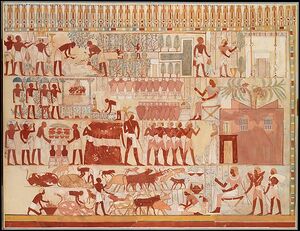Division of labour
The division of labour is the assignment of specific tasks to different producers within a system of social labour. This division not only results in increased work efficiency but also the unfortunate subordination of individuals to the system as a whole and an increasingly monotonous and repetitive style of work.
Concept
According to Marx, the division of labour allows one labourer to perform the work of five, ten, or twenty labourers. However, this same division also simplifies the work of the individual labourer, reducing his required skill-level. Work becomes a simple yet monotonous process. This simplified labour is now accessible to any worker and not only a highly trained specialist. According to Marx, this results in lower demand for labour and greater competition between wage-workers. The introduction of machinery likewise increases the simplification and monotony of the labour process.[1]
The Communist Manifesto states:
"Owing to the extensive use of machinery, and to the division of labour, the work of the proletarians has lost all individual character, and, consequently, all charm for the workman. He becomes an appendage of the machine, and it is only the most simple, most monotonous, and most easily acquired knack, that is required of him."[2]
In Critique of the Gotha Programme, Marx predicted that the aforementioned problems would be resolved only in a future communist mode of production:
"In a higher phase of communist society, after the enslaving subordination of the individual to the division of labour, and therewith also the antithesis between mental and physical labour, has vanished; after labour has become not only a means of life but life's prime want; after the productive forces have also increased with the all-around development of the individual, and all the springs of co-operative wealth flow more abundantly – only then can the narrow horizon of bourgeois right be crossed in its entirety and society inscribe on its banners: From each according to his ability, to each according to his needs!"[3]
References
- ↑ Marx, Karl. Wage Labour and Capital, 1847.
- ↑ Marx & Engels. The Communist Manifesto, 1847.
- ↑ Marx, karl. Critique of the Gotha Programme, section 1, 1875.
